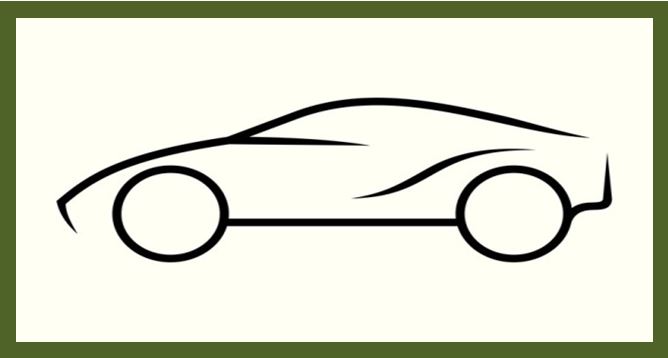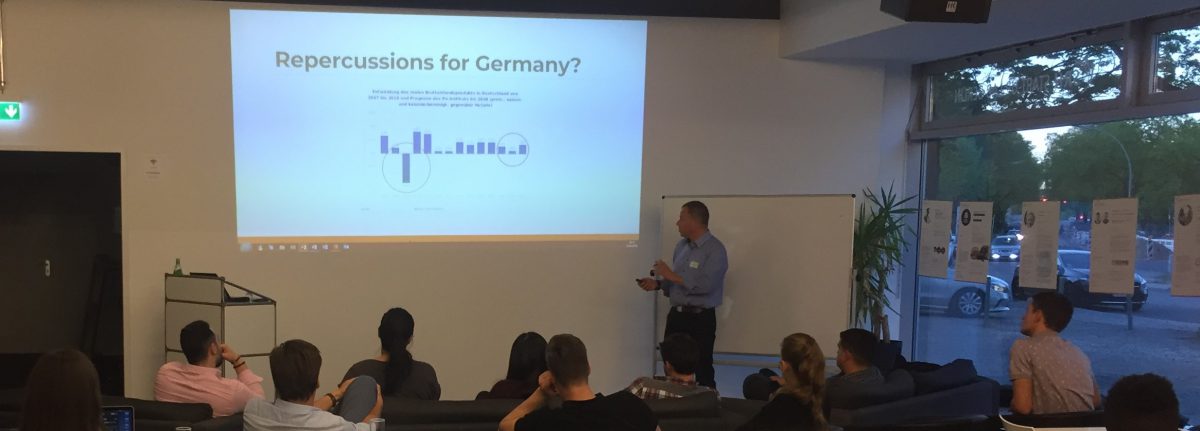…und die Neujahrsansprache des Bundeskanzlers interessiert Sie nicht besonders, weil Sie andere Sorgen haben.
„Stell dir vor, es ist der 31.12.2026, 20:30 Uhr…“ weiterlesenThe German economy in January 2026 – not only the weekend is nigh…
…yet also the month’s end. Hence, at the last hour, let’s go for the JANUARY details of the German economy:
„The German economy in January 2026 – not only the weekend is nigh…“ weiterlesenBerlin: Grüne Radwege?
Wissen Sie, wofür das Foto steht? Für das komplette Versagen des Berliner Senats bei der Verkehrsplanung. Mit viel tamtam war der rot-grüne Senat Ende 2017 an die Regierungsarbeit gestartet und hatte neben dem großzügigen Ausbau des Fahrradwegenetztes unter anderem auch beschlossen, alle Radwege grün zu streichen – u.a. um Falschparker abzuschrecken (hier). Soweit, so gut – oder schlecht. Schon bei der damaligen Bekanntgabe des geplanten grünen Anstrichs sah ich persönlich ob der fehlgeleiteten Prioritätensetzung nämlich eher rot.
„Berlin: Grüne Radwege?“ weiterlesenIn eigener Sache: „Forewarned is Forearmed !?!“
„Early warning & Forecasting for startups“
Wieder einmal hatte ich Gelegenheit, diesmal am 25. April 2019 als Redner an der Berlin Startup School, meine „Glaskugel“ an das überwiegend internationale Gründerpublikum zu bringen (näheres hier).
„In eigener Sache: „Forewarned is Forearmed !?!““ weiterlesenIn eigener Sache: „2019 – Cassandras Blick in die Glaskugel“
“How did you go bankrupt?“
„Two ways. Gradually, then suddenly.”
(Ernest Hemingway)
Nachdem ich mit meiner letztjährigen Prognose des „wirtschaftlichen Biedermeiers“ (hier) bis weit ins Dritte Quartal von 2018 richtig lag, habe ich auch für dieses Jahr wieder als Cassandra in die Glaskugel geschaut (für eine eher ironische Version, schaue hier).
„Geldpolitik“ – Kunst des Möglichen und Demokratiedefizit
Zwei aktuelle Posts aus dem Blog der FAZ, FAZIT, („Geldpolitik in den Sternen“ und „Keine Angst vor der Inflation“) stellen zum einen mal gut zusammengefasst jeweils die verschiedenen Möglichkeiten der Berechnung der Inflation und den Zielen der von den Zentralbanken betriebenen Geldpolitik (im Gegensatz zu der von Regierungen betriebenen Fiskalpolitik) dar.
Zum anderen geben einem beide Artikel in der Zusammenschau SEHR zu denken: „„Geldpolitik“ – Kunst des Möglichen und Demokratiedefizit“ weiterlesen
Stell dir vor, es ist der 31.12.2019, 20:30 Uhr…
…und nicht nur die Neujahrsansprache der Bundeskanzlerin, sondern auch folgende Ereignisse liegen hinter Ihnen: „Stell dir vor, es ist der 31.12.2019, 20:30 Uhr…“ weiterlesen
Carmageddon – Konturen werden erkennbar
Zwar hat sich die im Oktober 218 aufgezeigte negative Entwicklung der US-Verkaufszahlen (hier) bis Dezember wieder relativiert, weltweit aber scheint der Automarkt in die Rezession einzutreten, wie die nachfolgenden Daten zeigen: „Carmageddon – Konturen werden erkennbar“ weiterlesen
„Wenn Merz zur Mittelschicht zählt, bin ich Bodensatz“ (Manager Magazin)
(Hier). Stimmt. Bei dem Abstand zu den tatsächlich Reichen ist fast jeder Bodensatz. Aber so verhält sich das „Establishment“. Immer schön dazu gehören wollen. Aber wieso eigentlich? Ist „Reich sein“ vielleicht doch nicht so unanstößig?
Morning Briefing – 16 November 2018 – Brexit Special (English version)

(source: Schatzi)
Good morning,
If not today, when would there be a better time for a Brexit special? Especially since while typing these lines I’m sitting in a London hotel and watching construction workers finish the next skyscraper…. „Morning Briefing – 16 November 2018 – Brexit Special (English version)“ weiterlesen
Carmageddon – nun doch?

Ab und an entwickeln sich die Dinge doch anders, als man denkt – so auch bei Carmageddon: Während ich im August noch meinte, dass angesichts der positiven Verkaufszahlen „Carmageddon“ „anders aussehe“ (hier), befeuern die September-Zahlen (die als Quartalszahlen auch wieder GM-Verkaufszahlen beinhalten) Spekulationen über einen Crash am US-Automarkt: Demnach sind die Verkaufszahlen in den USA über den gesamten Markt hinweg um 5,6% im Vorjahresvergleich zurückgegangen (hier). Das ist viel. „Carmageddon – nun doch?“ weiterlesen
Cassandras – häufiger dort, wo man sie nicht vermutet

Zum Wochenende hatte ich mir drei Artikel „auf Halde gelegt“ – ohne zu wissen, dass sie im „Zusammenspiel“ nicht unbedingt für gute Laune sorgen würden. Im ersten zeigt ein ehemaliger Journalist der Financial Times, John Authers, in meinen Augen und vielleicht unabsichtlich ein „Sollen sie doch Kuchen essen“-Verständnis seiner Leser. Der zweite Kommentar, von Hans-Werner Sinn im Handelsblatt, zeigt für mich die Orientierungslosigkeit dieser Zeitung. Der letzte Artikel (samt Buch), vom Hedge-Fonds Manager Ray Dalio beweist in meinen Augen mehr „Cassandra-Qualität“, als FT und HB zusammen. In meinen Augen sollte es uns zu denken geben, wenn Spekulanten, wie Ray Dalio, mehr, schlüssigere und authentischere Warnungen abgeben, als die eigentlich dafür verantwortliche Presse. „Cassandras – häufiger dort, wo man sie nicht vermutet“ weiterlesen









